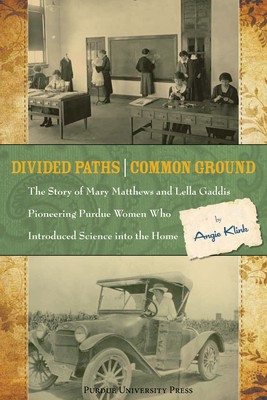
- We will send in 10–14 business days.
- Author: Angie Klink
- Publisher: Purdue University Press
- Year: 2011
- Pages: 249
- ISBN-10: 1557535914
- ISBN-13: 9781557535917
- Format: 14 x 21.3 x 1.8 cm, minkšti viršeliai
- Language: English
- SAVE -10% with code: EXTRA
Reviews
Description
In the early 1900s, Mary Matthews and Lella Gaddis forged trails for women at Purdue University and throughout Indiana. Mary was the first dean of the School of Home Economics. Lella was Indiana's first state leader of Home Demonstration. In 1914, Mary hired Lella to organize Purdue's new Home Economics Extension Service. According to those who knew them, Lella was a sparkler who traveled the state instructing rural women about nutrition, hygiene, safe water, childcare, and more. Reserved Mary established Purdue's School of Home Economics, created Indiana's first nursery school, and authored a popular textbook. Both women used their natural talents and connections to achieve their goals in spite of a male-dominated society. As a land grant institution, Purdue University has always been very connected to the American countryside. Based on extensive oral history and archival research, this book sheds new light on the important role female staff and faculty played in improving the quality of life for rural women during the first half of the twentieth century. It is also a fascinating story, engagingly told, of two very different personalities united in a common goal.
EXTRA 10 % discount with code: EXTRA
The promotion ends in 23d.06:45:56
The discount code is valid when purchasing from 10 €. Discounts do not stack.
- Author: Angie Klink
- Publisher: Purdue University Press
- Year: 2011
- Pages: 249
- ISBN-10: 1557535914
- ISBN-13: 9781557535917
- Format: 14 x 21.3 x 1.8 cm, minkšti viršeliai
- Language: English English
In the early 1900s, Mary Matthews and Lella Gaddis forged trails for women at Purdue University and throughout Indiana. Mary was the first dean of the School of Home Economics. Lella was Indiana's first state leader of Home Demonstration. In 1914, Mary hired Lella to organize Purdue's new Home Economics Extension Service. According to those who knew them, Lella was a sparkler who traveled the state instructing rural women about nutrition, hygiene, safe water, childcare, and more. Reserved Mary established Purdue's School of Home Economics, created Indiana's first nursery school, and authored a popular textbook. Both women used their natural talents and connections to achieve their goals in spite of a male-dominated society. As a land grant institution, Purdue University has always been very connected to the American countryside. Based on extensive oral history and archival research, this book sheds new light on the important role female staff and faculty played in improving the quality of life for rural women during the first half of the twentieth century. It is also a fascinating story, engagingly told, of two very different personalities united in a common goal.


Reviews